North Korea
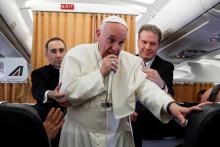
Pope Francis said on Saturday a third country, such as Norway, should try to mediate the dispute between North Korea and Washington, to cool a situation that had become "too hot" and posed the risk of nuclear devastation. Francis said he believed "a good part of humanity" would be destroyed in any widespread war.
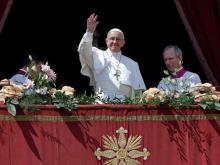
Pope Francis used his traditional Easter Sunday message to call the bombing of a refugee convoy near Aleppo, Syria, a “despicable attack”, and urged world leaders to “prevent the spread of conflicts” despite mounting tensions in Syria and North Korea.
In his Easter blessing, known as “Urbi et Orbi” (“to the city and the world”), the pope urged the faithful to remember “all those forced to leave their homelands as a result of armed conflicts, terrorist attacks, famine, and oppressive regimes.”

Pope Francis urged the United Nations on March 28 to seek the "total elimination" of nuclear weapons, speaking as the United States and some other major powers boycotted a conference considering a global ban.
In a message to the conference that started in New York on March 27, Francis called on nations to "go beyond nuclear deterrence" and have the courage to overcome the "fear and isolationism" he said was prevalent in many countries today.
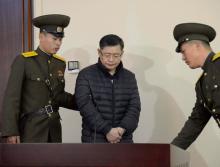
With North Korea leading the way and Islamic extremism rapidly expanding, 2015 was the “worst year in modern history for Christian persecution,” according to a group tracking this issue.
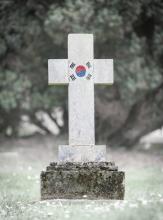
IN 1900, 1 percent of Korea’s population was Christian. By 2010, roughly 3 in 10 South Koreans were Christian, including members of the world’s largest Pentecostal church, Yoido Full Gospel Church, in Seoul. The faith has exploded, and so now have the questions.
Each of the past several summers in Washington, D.C., I’ve met with 50 young Christian leaders from South Korea to discuss biblical social justice as it applies to their Korean context and perspectives on our shared Christian faith. They highlighted challenges they face, such as confusing financial and church growth with God’s favor; the stress that youth face in their ambition for a viable career; and the roles sometimes assigned to women and men in both church and society.
They also posed a critical question: Do you think of yourself as a Christian first or an American first? Out of our deep exploration came three convictions: First, national identity can be a deep blessing, but it cannot be our primary identity. Second, discussion works best without immediately judging our priority lists or our neighbors’ lists harshly. Third, the order of our lists should never be the cause of harm.
These rich dialogues with Korean faith leaders set the stage for an unusual opportunity: attending the Global Forum for the Future of World Christianity held on Jeju, the politically contested island off the coast of South Korea.
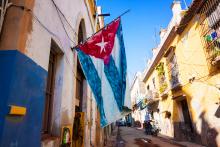
THOUGH SOME HAVE accepted “axis of evil” characterizations of Cuba and North Korea, my experiences of the two countries—nine visits to Cuba and one week in North Korea—have led me to far different conclusions: There are very few similarities between the two nations, and neither is inherently “evil.”
Music infuses the air in Cuba as in no other of the 60 countries to which I’ve traveled. The streets are alive. Children play baseball and soccer in the streets. Cafes, parks, and other public places are crowded and noisy. Nearly everyone I’ve met has treated me like a long-lost friend, even more so when they learn I’m American. There is a natural affinity between Cubans and Americans. More than 100 flights a week ferry people between Havana and Miami.
In North Korea, the streets are eerily quiet. There is virtually no visible human interaction. North Koreans are forbidden to make eye contact with Westerners. There appear to be no public gathering places except the massive government plazas where military parades and government rallies are staged. I was never allowed to go anywhere without a “minder.” I traveled with a Presbyterian Church (U.S.A.) official who was born in North Korea and returns there frequently. His counsel: “Assume that everywhere you go you are followed and that every conversation you have, no matter where, is bugged.” His relatives received permission to travel from their home village to Pyongyang to visit him. In our hotel room, he turned the television volume up to full blast before they began talking quietly. On one early morning walk near our hotel (the only time I was unescorted), I took a few photographs. By the time I returned to the hotel, government representatives were waiting in the lobby, demanding to see all my photos and instructing me on which ones to delete.
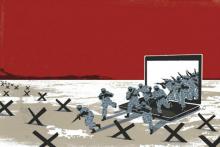
MANY QUESTIONS remain about the alleged North Korean hacking of Sony Pictures and the U.S. response. But the Christmas controversy, apparently triggered by the Seth Rogen-James Franco satire film The Interview, has made one thing perfectly clear: A lot has changed on the internet since Al Gore didn’t invent it.
Back in the days of Gore, the net was an attempt to provide a secure and resilient military communications network during our Cold War with the Soviet Union. But by the turn of this century, it had become an unrivaled public forum for democratic activism and an absolute paradise for shoppers and porn addicts. Now the internet is getting back to its military roots. It is both the weapon and the battleground for United States’ simmering low-level wars with not only North Korea, but China, Iran, Russia, and anyone else who gets in the way.
For several years there has been a steady trickle of back-page news stories about cyberwarfare. The Chinese military seemed to be hacking U.S. government and business sites for military and industrial espionage. Two years ago the Chinese were said to have hacked The New York Times in revenge for that paper’s reporting on the financial corruption of China’s leadership. North Korea has allegedly attacked banking networks in South Korea. Attacks said to originate in Russia have hit U.S. and European energy companies. In 2009, the ante was upped when the U.S. and Israel unleashed the Stuxnet virus to sabotage the Iranian nuclear program. The virus destroyed Iranian centrifuges, but it also escaped to the broader internet and sabotaged computers at the U.S.-based Chevron oil company.
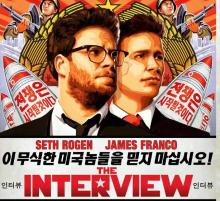
Unfortunately, we will not be able to watch Kim Jong-un’s assassination on the big screen this Christmas. We will not be able to cheer as the brutal dictator’s helicopter explodes in the air “ while Katy Perry’s ‘Firework’ plays on the soundtrack.” We will not be able to fulfill this Christmas Day fantasy by watching The Interview because the terrorists have won.
The FBI now claims that Kim Jong-un’s government is behind the act of terrorism. In retaliation for the movie, a state-sponsored North Korean cyber-terrorist group called “The Guardians of Peace” hacked into Sony Pictures and leaked sensitive information, including internal emails, future Sony films, and sensitive employee records. “The Guardians of Peace” also threatened movie goers with a “9/11 style attack” on every cinema that shows the movie.
After the threats were made and many theaters decided to pull the film, Sony Pictures canceled the release of The Interview. Sony said in a statement:
Sony Pictures has been the victim of an unprecedented criminal assault against our employees, our customers, and our business. Those who attacked us stole our intellectual property, private emails, and sensitive and proprietary material, and sought to destroy our spirit and morale – all apparently to thwart the release of a movie they did not like. We are deeply saddened at this brazen effort to suppress the distribution of a movie, and in the process do damage to our company, our employees, and the American public. We stand by our filmmakers and their right to free expression and are extremely disappointed by this outcome.
Washington and Hollywood are also in an uproar:
“Wow. Everyone caved. The hackers won. An utter and complete victory for them,”tweeted Rob Lowe. Jimmy Kimmel claimed that pulling the movie was, “an un-American act of cowardice that validates terrorist actions and sets a terrifying precedent.” Steve Carell said it was a, “Sad day for creative expression.” Sen. John McCain stated “yielding to aggressive cyber-terrorism by North Korea … sets a troubling precedent that will only empower and embolden bad actors to use cyber as an offensive weapon even more aggressively in the future.”
And White House officials are exploring retaliation, saying security leaders “would be mindful of the fact that we need a proportional response.”
The terrorists may have won the battle, but the United States will win the war!
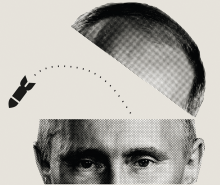
FOR MORE THAN two centuries, the United States has been the proudest example of democracy in the world. Maybe not the best, but definitely the proudest. Oh sure, we’ve hit some rough patches over the decades, mainly in dealing with our native peoples and other ethnic minorities. Also with women, the poor, the falsely accused, the unemployed, and people who aren’t bankers. But let’s just call those growing pains.
For the most part, America has been that shining city on a hill, and by America, of course, I don’t mean Canada or Mexico, or the other countries whose names I forget, most of which don’t have many good hills to shine from anyway.
But I’m not talking about geography, I’m talking about pride. The pride that comes from being number one in democracy, despite being number 55th in infant mortality and 35th in math. Okay, so we don’t test well. But we’re proud anyway. And we’re still number one in Bible science! [High five!]
But lately, because of continued dysfunction on Capitol Hill, people are starting to whisper that democracy in the United States may have lost some of its shine, like we’re “hiding it under a bushel,” as it says in the old Christian campfire song of my youth. (We also sang “With Jesus in My Boat I Can Ride Out the Current Economic Downturn,” and “Children, Go Where I Text Thee.”)
But if America’s “little light” is no longer shining, at least a few other nations are providing good examples of self-government.
![By U.S. Department of State from United States [Public domain], via Wikimedia Commons By U.S. Department of State from U.S., via Wikimedia Commons](https://sojo.net/files/styles/medium/public/blog/Secretary_Kerry_Meets_With_the_Family_of_Kenneth_Bae_%2812194118966%29%20%281%29.jpg)
Today marks Korean-American Christian missionary Kenneth Bae’s 500th day in a North Korean prison. Bae was arrested in November 2012 while leading a tourist group. State-run media reported that he was convicted of attempting to lead a religious anti-North Korean religious coup. He has been sentenced to 15 years of hard labor. Bae is a reminder to all of us that Korea remains divided. Brothers and sisters are separated and friends are divided between the 38th parallel.
I was born in Seoul, South Korea. My mother and father were children during the Korean War, and my mother told me a few stories of how they had to flee during the war. She was a young child, one of eight. My grandmother would gather the children and walk for miles and miles making their way down into southern Korea. As they were fleeing one day, a bullet went through my grandmother’s thigh and created permanent damage to her leg. As a young child, I thought it was a wonderful war story of heroism and courage. I didn’t realize then the agony, fear, and suffering that my parents or my grandparents went through to keep safe and keep alive.
As the Korean War lingered on, it ended with the division of Korea at the 38th parallel. That division is a stark reminder of how a beautiful, lovely country can be filled with pain, sorrow, animosity, and suffering. The 38th parallel has kept family members and loved ones apart for almost 60 years. Many divided families are unable to reunite or unable to know if their relatives are still living and doing well. The heartbreak of living apart in their own country has brought lots of anger, tension, loss, and suffering.
In Korea, people have a term for such suffering: han. Han is a difficult word to translate into the English language. The best way to do so may be through ‘unjust suffering’ or ‘piercing of the heart.’
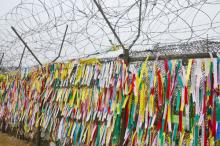
Walls exist between U.S. and Mexico. A few years ago, I took a class to the Mexico-U.S. border through BorderLinks, an organization that provides educational experiences to connect divided communities, raise awareness about border and immigration policies and their impact, and inspires people to act for social transformation. We visited the metal wall that separates the United States from Mexico at Nogales, Mexico.
The walls went up in 1994.
The North American Free Trade Agreement (NAFTA), established in 1994, was supposed to help with trade and the economic status of Mexico. However, it failed to do this. It backfired and made the economic situation worse for the people of Mexico. Rich corporations and companies that benefited from the Free Trade Agreement as they were able to move their factories down to Mexico where the labor was cheap and profits higher. As the economy of Mexico suffered, more people made their way, without documents, to the United States to seek work so they could support their families.
In 2006, the United States responded with the Secure Fence Act. As President George W. Bush signed the bill, he stated, “This bill will help protect the American people. This bill will make our borders more secure. It is an important step toward immigration reform.” The act included provisions for the construction of physical barriers — walls — and the use of technology to these ends.
This wall is under constant surveillance to prevent people from entering into the U.S. illegally. Ironically, it is a wall built from the remaining metal landing scraps of the Gulf War. The border is highly militarized with patrols who treat migrants as “prisoners of war.” It symbolizes militarization, greed, xenophobia, hatred, pride, nonsense, and fear of the other, a reminder of wanting to protect what is yours and not sharing what God has given you. Walls continue to go up along the border as the people of the United States continue to fear that undocumented people will take away jobs. These fears may devastate the lives of the poor in both countries.
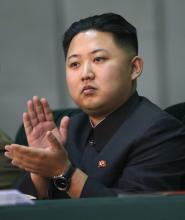
The fact that North Korea’s young leader Kim Jong-un is threatening the world with nuclear holocaust does what World War I did to many theologians who had presumed that history was on a course of inevitable progress.
It is not.
The power of death is enticing, a sin to which Robert Oppenheimer, the father of the bomb, later confessed. The human will to power becomes evil when real soldiers, real nuclear bombs, real missiles, and real threats of destruction are mistaken for childhood toys or computer games where human folly can be erased by hitting a reset button.
We are all children inside, for good and for ill.

Does violence rule our species? The barrage of international conflicts now in the headlines seems to suggest that violence may be the one language we have in common.
Though we all speak it fluently, very few of us learned it in school. We didn’t have to study its “vocabulary” and “grammar rules” – no, it was much easier than that. Humans pick violence up by immersion and so we are all native speakers. From Syria to Korea to Pakistan to Iraq to the U.S., the language of violence is so natural to us that we couldn’t recite one of its “grammar rules."
Sadly, ignorance of language rules does not diminish fluency. The odd thing is that if we stopped to learn the rules governing our fluency in violence, it would actually make us less fluent. Why? Because the rules of violence reveal an unpleasant reality: We don’t use violence; violence uses us.

Today, March 19, 2013, is the 10th anniversary of the “Shock and Awe” campaign that was intended to rid the world of the threat of Saddam Hussein’s weapons of mass destruction in Iraq. As it turned out, the threat was a lie. There was ample evidence at the time to prove that the WMDs didn’t really exist, but were manufactured in Saddam’s imagination for political gain.
So why did we fall so easily for this lie? Answers to this question often come via an analysis of the particulars of the Iraqi situation and include discourse about oil fields, geopolitical calculations, even psychological analysis of the relationship of Father and Son Bush. These are good discussions to have. We can learn a great deal from them about our thirst for security and insatiable appetite for oil, political power, and revenge.
Be a part of the movement to redefine the public's perception of North Korea.
ON SEPT. 23, 2003, Steven Kim was arrested and later escorted into a detention center in northeastern China with bound hands and heavy chains on his feet. His crime? Helping undocumented migrants—North Korean refugees—in China.
After decades of famine, mismanagement of resources, and a severe state-controlled system, the Democratic People's Republic of Korea—more commonly known as North Korea—has evolved into one of the most secretive and isolated countries in the world. About 2 million people have died since the 1990s, and still the country cannot feed its people without foreign aid. This shortage of food has driven thousands of North Koreans to migrate illegally to China by crossing the Tumen River in search of food and respite from the totalitarian regime.
Before his imprisonment, Kim—a Korean-American businessman from Long Island, N.Y.—lived in China and operated a furniture business. As a non-denominational Christian, Kim became a member of an unregistered house church in Shenzhen, which operated outside the Chinese government's control. After meeting Tae Nam, a North Korean man, and hearing his desperate story firsthand at his house church, Kim was instantly drawn into the underground railroad of supporters of North Korean refugees.
AFTER SEVEN MONTHS at a detention center, Kim was sentenced to five years in prison, under Article 318 of the Chinese criminal code, for helping undocumented North Korean migrants and harboring them in his home.
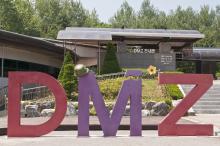
Recently, I had the opportunity to visit the DMZ (Demilitarized Zone) between the two Koreas along with a group of students and faculty from George Fox University. As the most fortified border on the entire planet, the DMZ contains an arsenal of tanks, land mines, watchtowers, razor wires, artillery, and nearly two million armed troops ready to face off within a moment’s notice. Former President Bill Clinton described the DMZ as the “scariest place on earth,” a description more eerie coming from one of the few people in history to have had direct access to the “button.”
While observing the various sites within the DMZ, I thought about how the pacifist Quakers, who founded my school in 1885, would have reacted to such an experience.

New Law Aims To Shine Light on Conflict Metals; Immigration Effort Mistakenly Holds U.S. Citizens; North Korea’s Persecution of Christians Expected to Continue After Kim Jon Il’s Death; Muslims push Lowe’s boycott over reality series; Two Muslim religious leaders sue airlines for discrimination; Christianity goes global as world’s largest religion; (Opinion) Obama’s simplistic view of income inequality.

North Korean Leader’s Nukes, Threats Stoked World Fears; Extension of Tax Cut Stalls in House as GOP Objects; Christian Group Recalls Pink Bible; For Times Such As These: The Radical Christian Witness of the New Monastics; ‘People’s year’ gives hope that the tide is turning; Speaker targets immigration law; Vaclav Havel, Czech’s Velvet Revolution Leader, Dead at 75; Paul Leads Iowa, Gingrich drops to 3; Mitt Romney’s Dream World: Cutting Billions Out of Medicaid Will Not 'Hurt the Poor'.